|
Dorman Avenue South
Aylesham
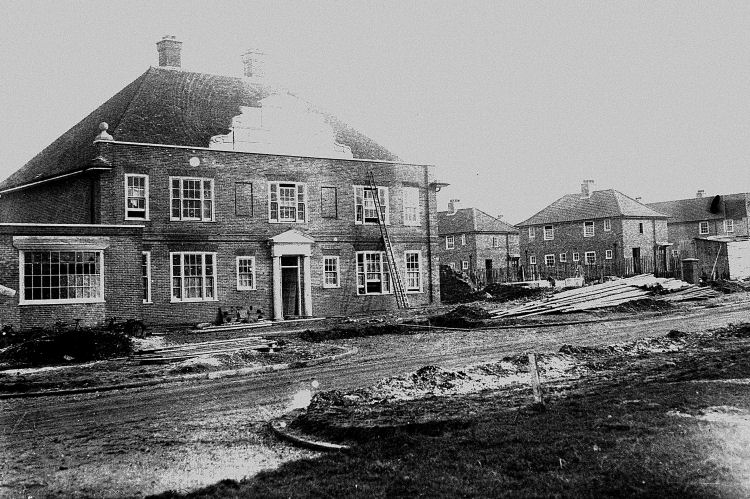
Above shows the "Greyhound" in the process of being built, circa
1928 |
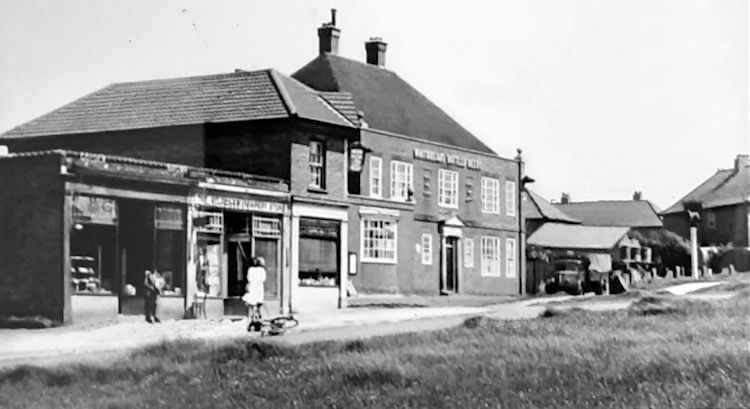
Above photo, date unknown. |
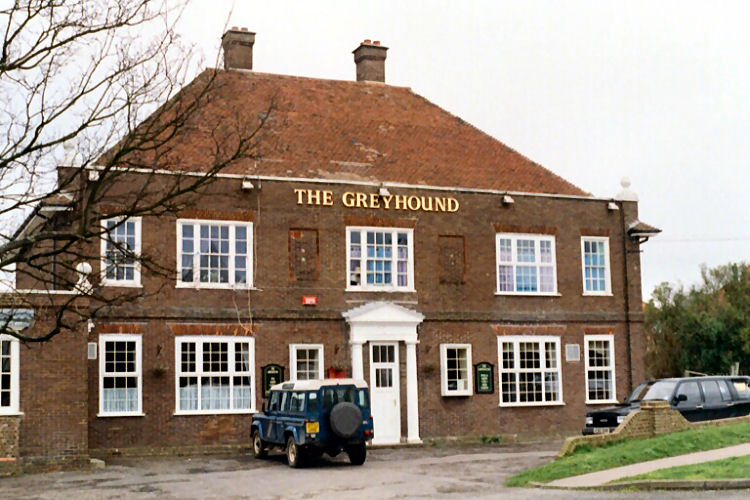
Above photo about 2003 kindly sent by John Leach. |
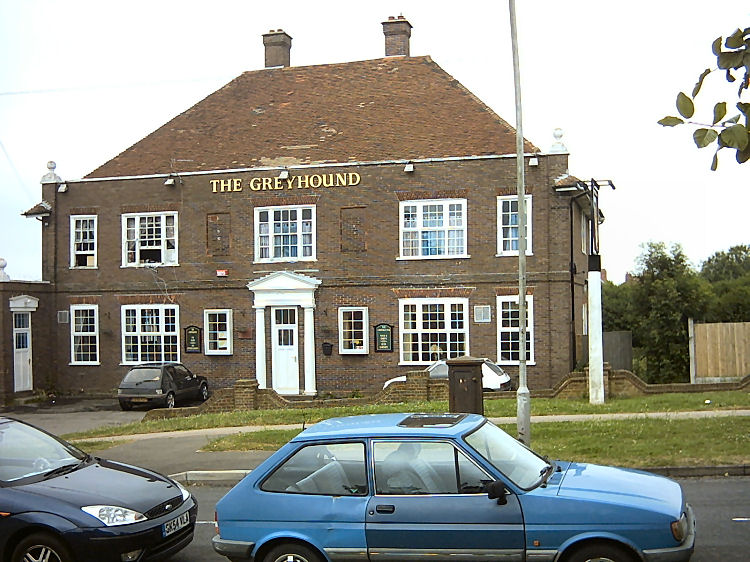
Above photo about 2005 kindly sent by John Leach. |
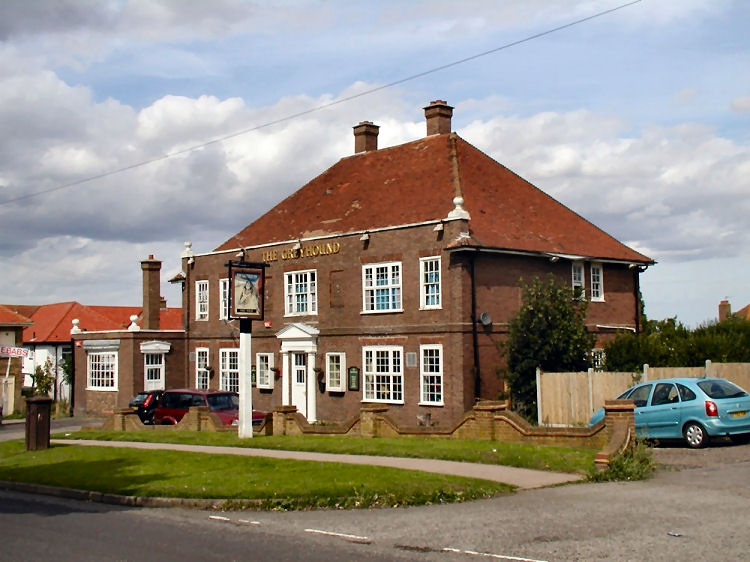
Above photo, 2005, by Laura Clarke. |
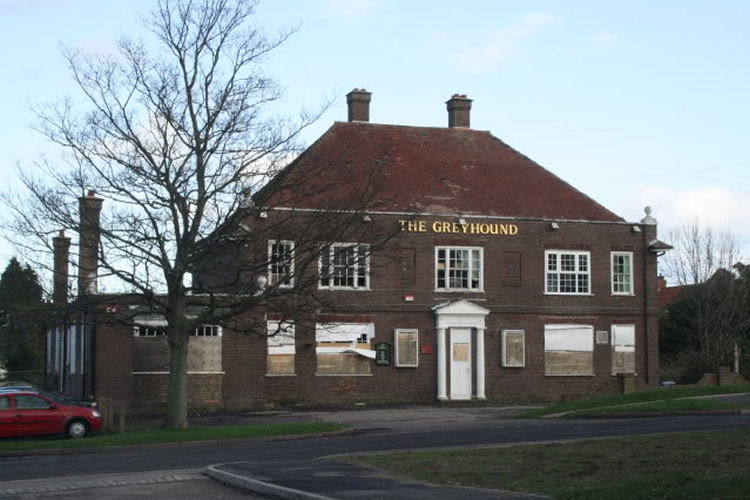
Above picture taken from "Riding with the Angels"
www.kenthistoryforum.co.uk/
November 2009. |
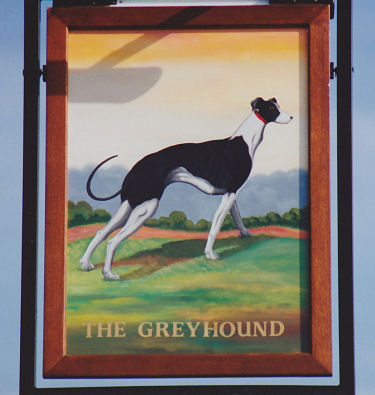
Greyhound sign July 1991
Above with thanks from Brian Curtis
www.innsignsociety.com |
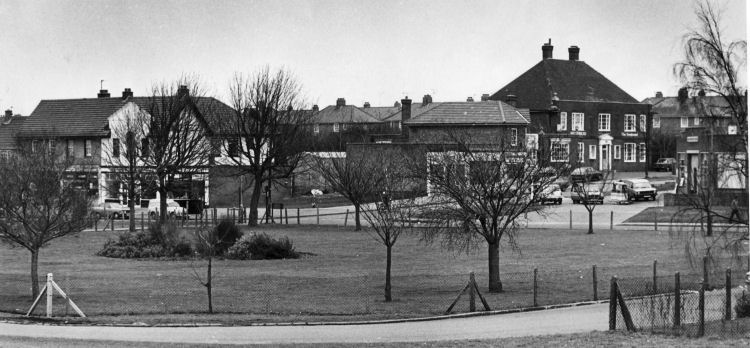
Above photo kindly supplied by Dover Library ILL/3719, showing the
Greyhound in 1981. |

Above photo taken from "Your Dover" 30 Sept 2009. |
Opened on 9th January 1928, the entire village of Aylesham was built to
accommodate the miners in the then expanding East Kent Coalfields.
Unfortunately closed in 2005, and in March 2003 part of the premises
operated as a pizza delivery service.
Planning permission was applied for 4th December 2007 to change this
premises into a day nursery. However, the decision was refused for the
following reason:- The applicant has not demonstrated that the site has been
adequately marketed for the purposes of a public house; therefore this
proposal could seriously prejudice the economic and social facilities within
the village of Aylesham. Therefore the proposal is contrary to policy SP11
of the Dover District Local Plan.
|
From the Dover Express and East Kent News, Friday,
4 January, 1929.
THE GREYHOUND, AYLESHAM
The Licensee of the "Greyhound," Aylesham, submitted plans for a dance
hall, as an extension to the premises. It would hold about 250 people and
would be chiefly used for meetings. The Police had no objections, and the
plans were approved, subject to the condition that no drink would be
supplied in the room.
|
|
From the Dover Express and East Kent News, Friday, 4
January, 1929.
TROUBLE AT THE GREYHOUND
John Holland and Joseph Holland, both of Aylesham, were charged with
wilfully damaging a window at the "Greyhound Hotel," Aylesham, on December
2nd, the property of William Arthur Roberts, to the value of 30s.
Joseph Holland pleaded guilty, and his brother not guilty.
they were further charged, and the same time and place, with disorderly
conduct and refusing to quit the premises when requested.
Both defendants pleaded guilty.
Mr. P. Bracner, of Maidstone, prosecuted, and asked the permission of the
Bench to withdraw the charge of wilful damage against John Holland as there
was no evidence against him. He asked the Bench to treat the case seriously
as the licensee wished his authority to be upheld by the Bench, so that he
could conduct his business in the house in an orderly manner according to
the law.
Daniel Condrey, a barman at the "Greyhound," said that he served the
defendants, and just before 10 o'clock the licensee shouted "Time!" so
witness went round the house getting the people to go. In the jug and bottle
departments were the defendants and a man named William Baines. He asked
them to go. One of them was drunk, and they said they wanted some more. Mr.
Roberts then left the till and asked them to go. he then tried to push them
out as they would not go, and witness help Mr. Roberts.
Frances Donnelly, a barmaid at the "Greyhound," said that she heard the
licensee call "Time!" punctually at 10 o'clock. From her position she could
see three bars - the big saloon, the small bar, and the jug and bottle
department. All the men left the premises except the two defendants and the
other man. Mr. Roberts asked them to go, but they took no notice of him, so
he asked witness to go for the Police. She could not find the Police, so she
returned through the kitchen entrance. When she went into the jug and bottle
department it was all confusion, and everybody seemed to be scuffling about.
Then the Police arrived but by that time Mr. Roberts had got the men out.
William Arthur Roberts, the licensee of the "Greyhound," said that he
always called "Time!" at five minutes to 10, and his assistant went round
locking the doors as the rooms became empty. On this occasion there were at
least 200 people on the premises and everybody left in an orderly manner
except the two defendants and Baines, who were in the jug and bottle
department. He was at the till. and asked them to go, but they would not. he
counted some more money, but they kept on shouting for more drink. he kept
on telling them to go, but they would not, and, in fact, told him where to
go to! he then got hold of John Hollands' arm and pulled him out. While he
was doing so a hand came round and hit him on the mouth, so he started to
use forcible methods and after a melee he got them all out. he went back to
the till, and he heard four panes of glass in one window were broken. he
went outside and told the Police Officers to take them in charge. Directly
he got outside Baines commenced to assault him, so he shook him up and put
him in a taxi. he turned round to help the Police, and Baines got out of the
taxi and "ran for it." The defendants were taken to Sandwich Police Station,
and charged, but he bailed them out as he did not want them to spend the
Christmas there, and took them home in his own car. he had had trouble of
this kind before, and on one occasion he had to put John Hollands out. As a
rule he was a quiet and well conducted man until he had drink. Joseph always
looked for trouble; in fact, he asked one of witness's servants to fight
him.
P.C. Chalmer, K.C.C., said he was outside the "Greyhound" at 10.10m p.m.
The doors were then closed and everything was apparently orderly. Five
minutes later the door of the jug and bottle department was opened and three
men left hurriedly. The two defendants were shouting and threatening the
licensee. The third man was sitting on the ground and was quiet quiet. He
spoke to the defendants and asked them to desist, but they refused, and
continued shouting. P.C. Ward then arrived and also asked them to stop.
Joseph Holland then rushed up to one of the windows and put his fist through
several panes. They were arrested, taken to Sandwich Police Station, and
charged.
P.C. Ward, K.C.C., said the defendants appeared to have a grievance
against the licensee. He asked them to be quiet, and as soon as he had said
this Joseph rushed towards the hotel and put his fist through a window and
said, "If I cannot get in through the door I'll go through the window."
Joseph made a statement at Sandwich, and they both signed it.
Joseph Holland said the licensee hit him with a piece of lead in a
leather case, and he still had the wound, in which he could nearly put his
finger.
Superintendent Lane said that Joseph came from Wigan, where he had twice
been convicted for drunkenness. Ever since he had been in the district he
had been a source of annoyance, and when he was brought into the Police
Station he was very threatening.
Lord Northbourne, addressing Joseph Holland, said it was quite evident
that he was a very foolish person when he was drunk. If he could not carry
drink properly he should never take it. There had been a silly brawl and he
was at the bottom of it. he would have to pay the damage, 30s, and he would
be fined 10s. They would both be convicted of disorderly conduct and fined
£2 each.
|
|
From the Dover Express and East Kent Intelligencer, 3 May, 1929. Price 1½d.
PROPOSED CLUB ROOMS AT AYLESHAM
Plans for the construction of a club room on the first floor at the
“Greyhound Hotel” were submitted by Mr. H. Ashenden, of Canterbury.
Supt. Lane opposed the application on the ground that the entrance to
the hotel was adjoining the entrance to the club room, and drew
attention to the fact that a club room in another part of the premises
was approved by the Bench recently and restrictions were placed on the
sale of intoxicants in that room. In his view, the present proposal was
in order to escape those restrictions. Mr. Ashenden said the brewers had
no objection to similar restrictions being placed on this proposed club
room, and added the other scheme had been dropped because it was found
too costly and it would have involved an expenditure of about £2,000.
The Bench, after a lengthy consultation, adjourned their decision for a
month.
|
|
From the Dover Express and East Kent Intelligencer, 17 May, 1929. Price 1½d.
AYLESHAM EXTENSION
Supt. Lane said that in the case of the application for an extension by
the “Greyhound,” Aylesham, he had told the licensee he would oppose it,
and the licensee then said he would not appear.
|
|
From the Dover Express and East Kent News, Friday, 6
February, 1931. Price 1½d.
WINGHAM PETTY SESSIONS
Mr. Bracher on behalf of Messrs. Jude Hanbury and Company owners of the
"Greyhound Hotel," Aylesham, applied for the renewal of a term licence as
the previous term licence of 3½ years had now expired.
The term licence was undoubtedly for the purpose of the monopoly value and
he now asked the bench to grant a further terminal of 5¼ years. There was an
agreement with the Commissioners of the Inland Revenue whereby, if the
application were granted, the monopoly value of £1,750 extended over five
years.
The Chairman: Why should it take the place of the
annual licence?
An official of the Inland Revenue Department said the
monopoly value had been agreed at £350 per annum. he thought it was usual to
grant these licences for three years, then five years and annually
afterwards. he asked the Bench to consider the district as developing and at
the end of five years they would be in a better position to arrive at the
future profits.
The bench retired and on returning, the Chairman said
they had decided to grant as annual licence, and the question of the
monopoly value would have to be adjourned to the 5th March.
|
|
From the Dover Express and East Kent News, Friday, 6
March, 1931. Price 1½d.
THE GREYHOUND ALLESHAM
Mr. F. Miskin, appearing on behalf of the brewers, the owners of the
"Greyhound," Aylesham, said the monopoly value had been agreed wuith the
Excise Authorities at £5,100, payable in one instalment.
Mr. Chamberlain, for H. M. Customs, said the agreement was subject to the
jurisdiction of the Bench, and he asked the Bench to make it a condition
that the amount be paid before the next Excise Licence was taken out, before
1st October next.
This was agreed to.
|
|
Whitstable Times and Herne Bay Herald 11 April 1931.
Mr. B. Waddy successfully applied for confirmation of an "on" licence
granted by the Justices of the Wingham Division in respect of the "Greyhound," Aylesham, Nonington. Mr. Waddy pointed out that the term licence granted
three years ago was coming to an end. There was no opposition in the Court
below on that day.
|
|
Dover Express, Friday 05 October 1934.
Wingham Petty sessions. Licence Transfer.
The licence of the "Greyhound," Aylesham, was transferred from Philip
Wyle to Reginald Rawlings.
|
|
From the Dover Express and East Kent News, Friday, 6
November, 1936.
AYLESHAM LEGION DINNER
The licensee of the "Greyhound," Aylesham, was granted an extension on
November 7th for the annual dinner and dance of the British Legion.
|
|
From the Dover Express and East Kent News. 24 November 1939.
Obscene language at Aylesham.
David Mavin, 54, Hyde Place, Aylesham, pleaded guilty to using
obscene language in Dorman Avenue South, Aylesham, on 21st October.
P.C. Starbuck said that the offence occurred at 11.10 p.m., outside
the "Greyhound" public house. Defendant had been drinking.
Defendant said he must have had too much to drink. He remembered
nothing of it in the morning.
Fined 21s.
|
|
From the Dover Express and East Kent News. 27 February 1942.
Aylesham Nuisance.
John Brown, 44, Meyrick Rd., Willersden, was summoned for committing
an indecent act, contrary to the K.C.C. bye-laws, at Dorman Avenue,
Aylesham, on Jan. 17th.
P.C. Starbuck said the offence was committed when defendant came out
of the Greyhound public house at 10 p.m. He took no notice when twice
told to go to the proper place.
Defendant wrote that he was sorry he had made a nuisance of himself.
A fine of £1 was inflicted.
|
|
Dover Express 3rd September,1943.
Wingham Petty Sessions at Canterbury 2nd September 1943.
Ernest Bennett and Mrs. Margaret Bennett of 6 Milner Crescent, Aylesham,
(formerly of “The Greyhound”, Aylesham) were summoned for embezzling the
sum of £169. 1s 4d the property of Philip W. Wyle. Defendants applied for
an adjournment and, with the concurrence of Mr. A. K. Mowll for the
prosecution, the case was adjourned for a fortnight. |
|
Dover Express 17th September 1943.
AYLESHAM MAN AND WIFE FOR TRIAL.
ALLEGED DEFICIENCIES AT “THE GREYHOUND”.
An alleged deficiency of £169. 1s 4d over the period February 20th to
March 14th at “The Greyhound”, Aylesham, led to the appearance at
Wingham Petty Sessions at Canterbury yesterday (Thursday) of Ernest
Bennett and his wife, Margaret Bennett, joint managers at the time and
now of Milner Crescent, Aylesham, on charges of embezzling that sum, the
monies of their employer, Philip Wyle, the licensee. Mr. A. K. Mowll
prosecuted and Mr. P. A. G. Aldington represented the defendants, who
elected to go for trial. Evelyn H. Hebden Phillips, partner in the firm of C. Hebden Phillips &
Son, carrying on business at Oaten Hill, Canterbury, as hotel valuers
and accountants, said “The Greyhound”, Aylesham, was let by
Messrs. Mackeson and Co., to Mr. Philip Wyle, who had since been in
ill-health for some years, Mr. & Mrs. Merrick were put in the house and
acted as managers for some years, during which time Mrs Bennett was
engaged as an assistant in the bar trade. Towards the end of 1942
Mr. Merrick had to leave to join up and Mrs. Merrick went to Wales to look
after Mr. Wyle. Mrs Bennett was then appointed manageress. In
consequence of certain instructions, witness went to “The Greyhound” on
January 12th and saw Mr. & Mrs. Bennett and he raised the question of what
he considered the mismanagement of the business and, after some
conversation, suggested they should be jointly manager and manageress.
The stock was taken on February 20th. Defendants left on March 14th, on
which date witness himself took stock, finding a shortage of £169. 1s.
4d. Cross examined witness said he knew of no written agreement with
defendants. He remembered meeting defendants at “The Greyhound” with
Mr. Wyle about Christmas time, at which time Mrs. Bennett was alone in
charge. A cash book was left at the time and always. He raised a
question about some of the outgoings and, in particular, referring to
fictitious payments for cleaning materials and sundries, for which they
could produce no vouchers. He pointed out that that practice must not
continue and only items for which vouchers could be produced could be
entered on the expenses side of the book. He did not know that these
un-vouched for items were put in the book at the request of Mr. Wyle and
he knew of no arrangement by which defendants were to send Mr. Wyle sums
out of the takings from time to time. He knew they had to send him
tobacco at cost price, which was credited on the stock sheets. Had they
also sent him Scotch whisky at cost price they would have had the right
to have it credited on the sheets. He had not heard of an arrangement
whereby defendants had to send Mr. Wyle, periodically, out of the
takings, sums representing 11s on every barrel of bitter sold. Had he
heard of anything like that, he would have stopped it immediately. There
was nothing in the cash book indicating that such sums had been sent. If
£4. 8s 6d were sent on February 17th and was taken from the takings
before they were recorded, it would account for a proportion of the
shortage. If sent after recording, he would not know about it. None of
the payments said to have been made were shown in the books or the stock
sheets. Replying to Mr. Aldington, witness said that, in view of his suggestions,
it was quite likely that Mr. Wyle would be called as a witness at the
trial. Defendants were given notice by registered post and the stock taking was
carried out in Mr. Bennett’s presence on the day they left. The
discrepancy was discovered when the stock sheets were completed at a
later date. When defendants left, they handed over cash in hand
amounting to over £217. Deficiencies had been found at previous
stocktaking's and, in one case, a surplus of £1. 14s 6d. John E. Jarvis, stock-taker on the staff of Messrs. Hebden Phillips, gave
evidence as to taking stock at “The Greyhound” on February 20th. On the evidence, defendants were committed for trial at the East Kent
Quarter Sessions on October 5th. They pleaded not guilty and reserved
their defence. They were allowed bail in their own recognizance's of £20
each. Mr. T. G. Elphinston was the presiding magistrate. |
|
Dover Express 8th October 1943.
The case against Ernest Bennett (44), miner, and his wife, Margaret
Bennett (39) of Milner Crescent, Aylesham, collapsed at the East Kent
Quarter Sessions at Canterbury, on Tuesday when, having elected to go for
trial, they appeared on a charge of between February 20th and March 14th
at “The Greyhound”, Aylesham, embezzling the sum of £169. 1s 4d received
on behalf of their employer, Philip Wyle.
Mr. B. Waddy prosecuted and Mr. L. S. Fletcher was for the defence. Outlining
the case, Mr. Waddy said that, owing to illness, Mr. Wyle did not live at
“The Greyhound” and, in January, Mr. & Mrs. Bennett were appointed joint
managers. During the period mentioned in the charges, goods to the value
of £740 odd had been sold, but the amount of money tendered by the
Bennetts was short by £169. 1s 4d. There was only one conclusion and
that was that the Bennetts misappropriated the money.
Evidence was given by Mr. John E. Jarvis of 23 Oaten Hill, Canterbury,
and by Evelyn Hebden Phillips as to the figures.
The Chairman (Mr. A. de la Poer Beresford) pointed out that, in an
indictment for embezzlement, the missing money must be identified and a
claim on a general deficiency could not be made. In his opinion, the
prosecution had failed to discharge the duty of identification.
|
|
Dover Express 16th August 1946.
WINGHAM PETTY SESSIONS.
The Wingham Petty Sessions were held at Dover on Thursday before Messrs.
E. T. Lambert, F. P. King, G. Hopkins, G. Newman and F. Turner.
An Aylesham Scene.
Michael Tomlinson of School House Terrace, Lossiemouth, formerly
stationed at Aylesham, was summoned for assault by Frank Charles
Williams of Aylesham on 28th July.
Defendant wrote pleading guilty “under great provocation”.
Complainant said that he was at the “Greyhound”, Aylesham, and, at 10.5
p.m. he was with his wife and daughter. His daughter tripped over whilst
going out the back way. Defendant was there and started an argument.
Witness went to see what it was about and defendant, a perfect stranger,
took hold of his wrists. He then released witness’s hand and hit him in
the jaw, sending him to the ground. Witness was bruised and bleeding and
reported to the doctor on 30th July and went back to work, loading at
the pit, on August 12th.
Mrs. Elsie Williams, wife of complainant, gave similar evidence.
Defendant’s letter stated Mr. Williams was dancing about in the centre of
the room, obviously the worse for drink. Williams then made to attack
Mr. Stanley (complainant’s son-in-law), so he (defendant) got between
them. Williams made several swings at him and was evidently beyond
reasoning with, so he gave him a short jab in the jaw. Mrs. Williams
used such language that, even he, who had been six years in the army,
was shocked.
In reply to the Chairman, Williams denied striking at defendant and said
that he did not have any more than six pints that night.
Case dismissed.
|
|
Dover Express 27th June 1947.
EX-MINER’S SAD END.
The Deputy Coroner for East Kent (Mr. Wilfred Mowll) conducted an
inquest at the “Greyhound Hotel”, Aylesham, on Monday, on the body of
James William Hughes, aged 71, who was found dead on Saturday evening in
the gas-filled scullery of 35, Queen’s Road, Aylesham.
Albert Hughes of 35, Queen’s Road, Aylesham, said his father had resided
with him for about six months and was fairly active but beginning to get
a bit feeble. Until about March he was employed at the Ministry of
Supply Depot at Bekesbourne Aerodrome and was formerly a miner. For some
years, he (deceased) had worried over his wife, who was in Chartham
Mental Hospital, and he (deceased) was a voluntary patient there from
April 18th to April 26th when he discharged himself. Recently he had
suffered with delusions and, on Friday, Dr. Bellamy was called and
prescribed some tablets. They were obtained from the chemist, one was
given to deceased on Friday night, and the box containing the others –
about a dozen – was put out of deceased’s way. On Saturday deceased
seemed a bit better and quieter and said he would be alright if witness
and his family went out. They left home about 7 p.m. and, on returning
about three hours later, smelt gas and found deceased on a blanket on
the scullery floor with his head in the gas oven and his head and
shoulders covered with another blanket. Witness turned off the gas,
opened the door and window, and pulled his father away. Dr. McRae and
the police were sent for. His father had found the tablets and the empty
box was on the kitchen table.
Dr. Ian B. McRae said he was called at about 10.15 p.m. and, on arrival
at about 10.30 found a strong smell of gas. Artificial respiration had
been carried out very efficiently by P. Sgt Feasey, but life was extinct. Death had occurred within half an hour of his arrival. After seeing a
confidential report from Dr. Bellamy, witness said it would appear that
deceased had taken 10 or 11 of the tablets – very close to a fatal dose.
They could not have been taken very early in the evening or deceased
would not have been able to make the other preparations. The cause of
death was coal gas poisoning.
Returning a verdict of suicide whilst the balance of his mind was
disturbed, the Coroner said that, worrying about his wife and his own
mental condition, had, no doubt, played on deceased’s mind. He expressed
sympathy with the relatives.
|
|
From "Inns of Kent"; Whitbread & Co. Ltd.; 1948.
After Barham it was something of a revolution in ideas to seek out the
mining districts of Kent, so little known, so vital to the country's
needs and, in a way, so odd. As a comparison the Forest of Dean mines
come to mind, where slums exist in an earthly paradise; but at Aylesham,
which was built and laid out in the twenties of this century, will be
found a clean modem township with all the amenities of suburbia. The
coast lies within a few miles, and it is surrounded by Kent and all the
name implies. The "Greyhound" at Aylesham was designed with the town, is
run for the miners and gives all the service required of a miners' inn.
The "White Horse" at Finglesham serves the Betteshanger Colliery in much
the same capacity. ...
|
|
From the Dover Express, 19 May 1950.
WINGHAM PETTY SESSIONS
In contrast to their seven hour sitting at Dover a fortnight ago,
business on Thursday at Wingham Petty Sessions, apart from income tax
and maintenance defaulters was confined to two small cases. The
Magistrates ordered an adjournment until 15th June in the case of
Charles Jaynes, of "The Grayhound," Aylesham, summoned for leaving his
car in the centre of a road and with no rear light, and an absolute
discharge for Bmdr. William Thompson, of 6c, Old Broadlees M.Q., Guston,
summoned for keeping a dog without a licence.
|
|
From the Dover Express, 18 May 1951.
Not Licensed for Dancing.
Snowdown Masked Ball Problem.
When Charles Jaynes, of the "Greyhound," Aylesham applied at Wingham
Petty Sessions at Dover yesterday for an occasional licence to sell
liquor at Snowdown Restaurant on June 9th at a masked ball there, the
Chairman (Mr. T. G. Elphinstone) pointed out that the restaurant was
not, in fact, licensed for dancing.
Jaynes: No, I know it's not, but they do have dancing there.
Remarking that it was no concern to the Bench yet, because no offence
had then been committed, the Chairman announced the Magistrates'
decision to grant the application until 10 p.m.
|
|
From the Dover Express and East Kent News, Friday 3
April, 1953.
DARTS CHAMPIONS
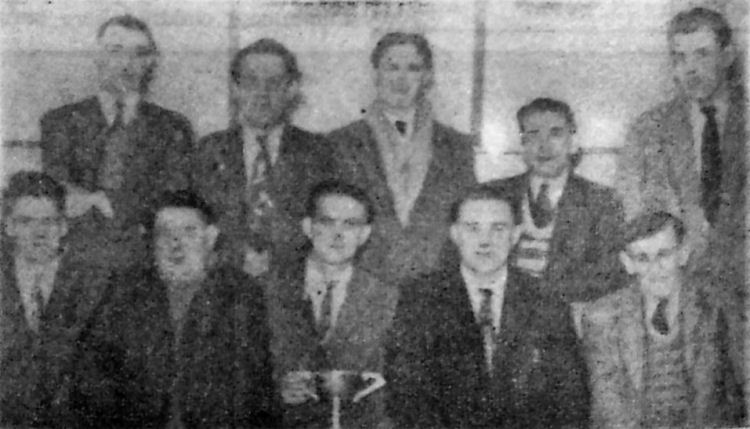
"The Greyhound," Aylesham, darts team, which won the Whitbread
Challenge Cup. Standing: J. Henderson, G. Gibson, V. Roycroft, B. Wall,
F. Llewellyn. Front: C. McIntyre, T. McEwen, F. Carman, J. Robson and F.
Waller.
|
|
From the Dover Express and East Kent News, Friday 18
January, 1963.
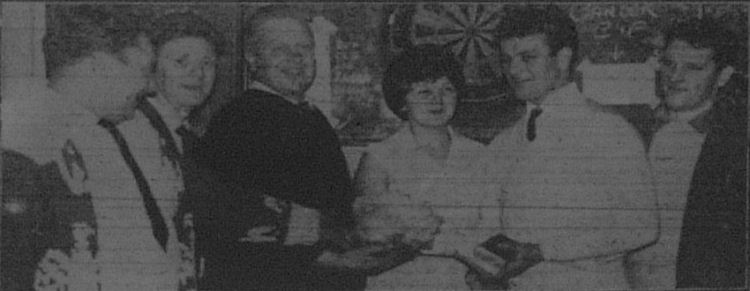
Former Snowdown, Dover and Margate footballer Jim Jenkin's receives
parting gifts from friends at the "Greyhound," Aylesham, before his
departure, last week, for Australia.
|
|
From the Dover Express, 31 July 1970.
Bench grant license for gambling card games at the
'local'
An application to play solo, Nap and Nine Card Don had Mr. Frank
Rose, the chairman, and the bench foxed at Sandwich. "This is what is
known as groping in the dark," he told the applicant, Mr. Ted Cooper, of
the "Greyhound Hotel," Aylesham.
The application, the first of its kind to come before the bench, was
granted, but not before Mr. Cooper had explained the workings of Nine
Card Don to Mr. Rose. "I can see I shall have to come over and be
initiated," said Mr. Rose.
Nine Card Don is a game similar to whist, with a tricky system of
trumps card values and scoring. Mr. Cooper learnt it as a boy in
Staffordshire. "I have a large number of visitors from the north who
like to be able to play it," he told the court.
LOW STAKES
Stakes for the game, and for Nap were fixed at 1s. maximum, with 3d.,
6d. and 9d. for Solo.
"I expect there will be more applications coming before the courts."
Mr. Cooper, chairman of the Wingham and Sandwich Division, Licensed
Victuallers' Association told the Dover Express. "We are always being
asked what games can be played besides cribbage and dominoes."
|
The CAMRA meeting in September 2008 reported that the pub may be split
into offices and a pub/restaurant.
The CAMRA meeting of 18th January 2010 reported that an application has
been made for the demolition of the "Greyhound."
|
From the Dover Express, 1 April 2010
Report by Ryhs Griffiths
LANDMARK TO VANISH
One of Aylesham's most prominent landmarks is to vanish after a
last-ditch effort to save it failed.
The "Greyhound" pub in Dorman Avenue South, locally known as the Dog,
is to be demolished by its owner after a bid to have it granted
listed-status was rejected by English Heritage.
Attempt to gain listed status fails
Fight to save pub is over.
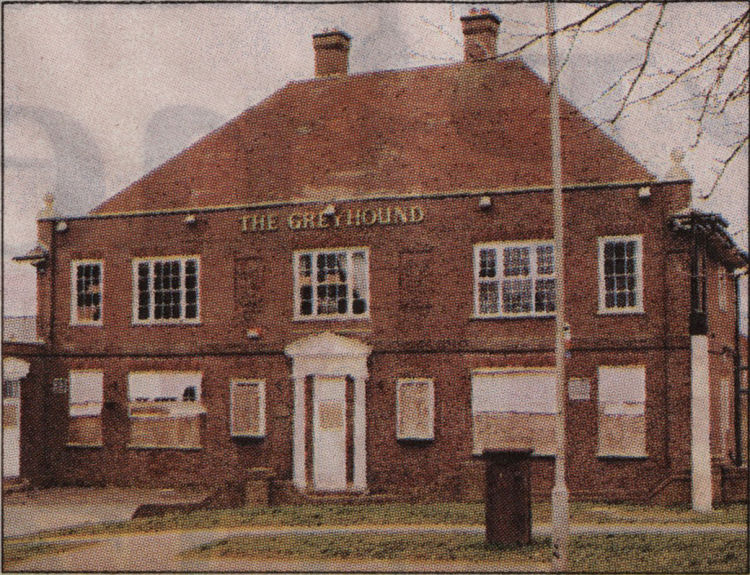
ONE of Aylesham's
most prominent landmarks is to vanish after a last-ditch effort to save
it failed.
The Greyhound pub in Dorman Avenue South, known locally as
the Dog, is to be demolished by its owner after a bid to have it granted
listed status was rejected by English Heritage.
Built in the 1920s when
the village was constructed to house miners at the nearby Snowdown
Colliery, the pub was a focal point in the community for generations.
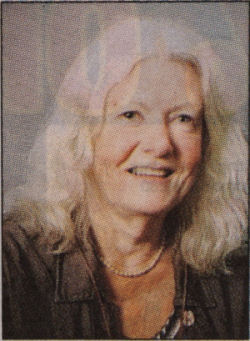
Councillor Linda Keen, who represents the village at the district
council and was at the heart of the campaign to save the pub, told the
Express the loss of the building is a sad moment for the community.
She
said: "It was all we could do to try and save it when we found out by
accident they intended to demolish it. At the time Dover District
Council had no obligation
to notify anyone.
"English Heritage decided not to list with great
reluctance, essentially they said too many original features had been
lost over the years so it was not enough to be of interest.
"But they said we should look at the other public buildings left in the
village, like the cafe on the square which used to be the miners
Library."
After discovering the plans to knock down the pub, Cllr Keen
successfully put a motion before the district council which would
require the planning department to inform ward councillors of plans to
demolish buildings in their neighbourhood.
But despite this small
victory, she is still disappointed the Greyhound could not be saved for
future generations.
Cllr Keen said: "It was the original hotel built in
the 1920s, people who came to mine here stayed there before the houses
were built. People are sad to see it go.
"People get on their high horse
about castles and cottages, but buildings like this are an incredibly
important part of east Kent social history.
"At least the district
council will be doing the decent thing in the future."
|
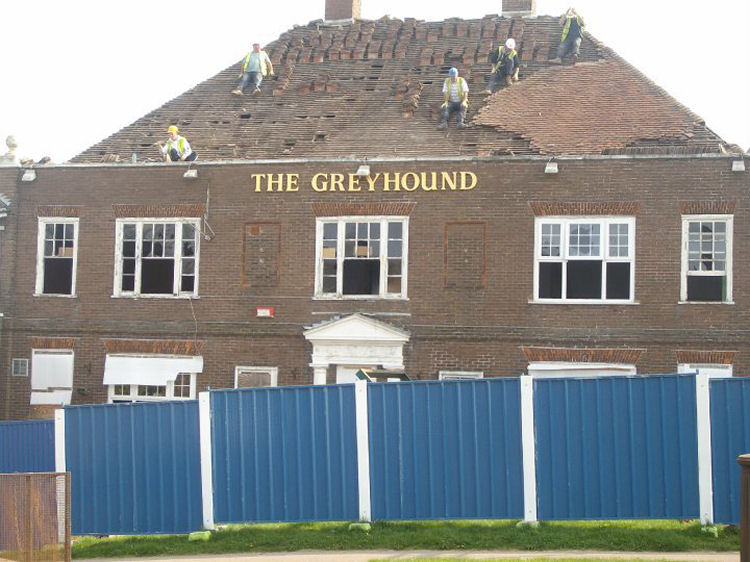
Above picture kindly sent by Vic Richards, showing the demolition of the
Greyhound, July 2010. |
Information received November 2011 tells me Planning application
11/00942. Erection of 6 semi-detached dwellings and construction of a
vehicular access.
|
From the Dover Express, Thursday, 17
November, 2011. 60p
A FUTURE FOR THE OLD GREYHOUND
Plans have been submitted for six homes, two designed to be
rented, on the site of the old the "Greyhound" public house at Aylesham.
Maidstone based Wright Holdings is applying for planning permission for
three pairs of two-storey semi-detached three bedroom houses on the
land.
A dozen car parking spaces to be provided.
The "Greyhound," in Dorman Avenue South was once one of the most
popular pubs in Aylesham.
|
|
From the Dover Express, Thursday 2 December, 2010.
PUB SITE PLANS
EIGHT semi-detached houses are planned for the site of what was once a
popular drinking hole.
Kent miners and their families used to frequent the popular "Greyhound"
public house at Aylesham but now a detailed planning application is
being made to Dover District Council to build the eight homes along with
two double garages on the site. The application is being made by Wright
Holdings through agents.
|
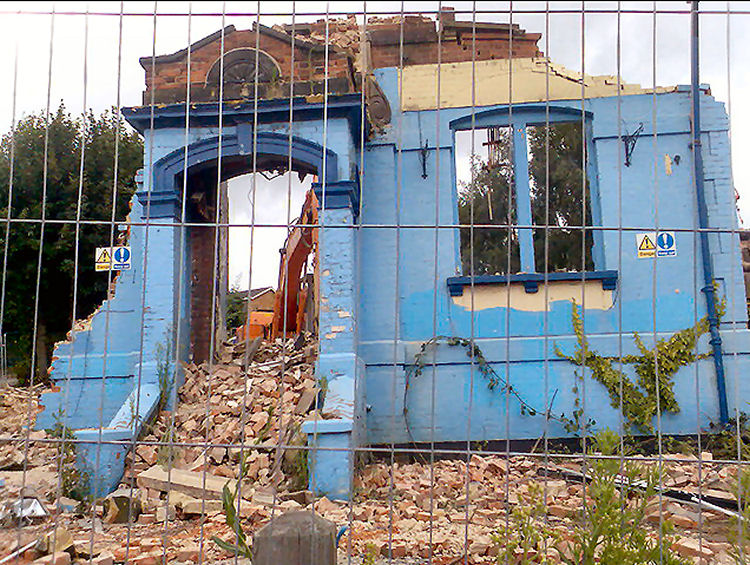
All that's left of the "Greyhound" photo by Francis Storr. |
LICENSEE LIST
ROBERTS William Arthur to Feb/1929

WYLE Phillip W Feb/1929-Dec/30


????
 WYLE Philip Aug/1933-Oct/34
WYLE Philip Aug/1933-Oct/34
RAWLINGS Reginald Oct/1934+

MERRICK Mr pre 1942
BENNETT Ernest & Margaret to end/1942-14/Mar/1943 (managers)
MEYRICKS David George 1949 end


JAYNES Charles 1951+
SINGLETON L 1961+
COOPER Adelaide 1974+
 Fremlins
Fremlins
http://www.closedpubs.co.uk/greyhound.html
 Library archives 1974 Library archives 1974
 From the Dover Express From the Dover Express
|













